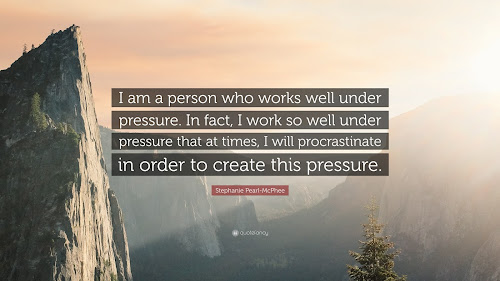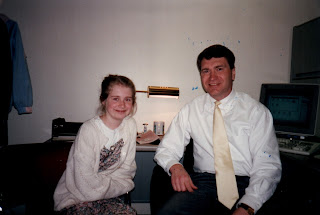The Eleventh Hour
Sometimes, the eleventh hour is where the magic happens.
Think about those epic, game-winning shots made with seconds left on the clock. Those spontaneous changes of plans that turn into the most unforgettable experiences. Those last-minute moments of brilliance that happen just before a deadline.
When I was younger, procrastination was always framed to me as something negative. Our society equates productivity with being the "early bird," with keeping a steady pace, with planning out our time in an organized and efficient manner. As I talked about in this post, there is a very clear preference in our culture for people who approach their work in a way that is overtly prompt and orderly.
And so, in turn I came to see procrastination as something inherently negative. And I began to see myself, a person with a propensity for procrastination, as somehow inferior to those who roll up their sleeves and get started right away.
Who can relate?
As a teacher, working with struggling students, I began to see that many "negative" student behaviors were actually the underside of something positive. A student who is quiet during class is usually a great listener. A student constantly up out of their seat is energetic. A student who can't stop talking to his or her classmates has great social skills. In grad school, Howard Gardner's Theory of Multiple Intelligences really spoke to me, and I began seeing it come into play with my own students -- each individual has his or her own unique strengths, but sometimes they manifest in ways that look like weaknesses. As an educator, I wanted to help my students recognize how to reframe these "negative" traits for the positives they could be. There's power in that -- in understanding how, on the other side of our flaws, we can find our strengths.
In turn, I've slowly been able to reframe the way I thought about one of my own perceived flaws -- procrastination. Here are a few strengths I've come to realize can walk hand-in-hand with waiting until "the eleventh hour":
1. Plenty of time to percolate. Just because procrastinators don't start the actual, physical work right away, we should not assume that they aren't working. In studying my own patterns, I've realized that I actually do most of the mental "heavy lifting" for days or weeks before I begin the actual work. Before writing a research paper, I'm mentally planning it out far ahead of time, thinking about my position and arguments. By the time I sit down to actually write it, it's pretty well fleshed out in my head, so the writing comes easily. This can actually be a benefit, because it means less time spinning our wheels once we finally do get to work.
2. Diamonds form under pressure. I'm pretty sure this sentiment has been kept alive by procrastinators like me, but there's some truth to it. When we perceive ourselves as having less time to complete a task, it can give us the adrenaline rush we need to do our best work. It lights a fire underneath us, gives us a sense of urgency, thus helping us to work more effectively and efficiently than we do otherwise. Not everyone thrives under pressure, but there are plenty of people who do.
3. Less time = less indecision. When you complete your work far before the deadline, there's plenty of time to hem and haw over it, to second guess your choices and consider tearing the whole thing apart and starting over. Let's go back to the example of the game-winning shot with moments left on the clock. The less time we have to act, the less time we have to think -- and sometimes, this can be a good thing. With minutes left to go, the player must shut off their mind and act without inhibition. Sometimes, our minds can get the best of us, allowing self-doubt and indecision to cloud our ability to act. When you reach the eleventh hour, there's this "now or never" mentality that allows us to act without our thoughts getting in the way.
In the process of writing my novel, I've come to embrace the eleventh hour. Back in November when I participated in NaNoWriMo, I had 30 days to write 50,000 words. This type of self-imposed deadline is pure gold for procrastinators, because it forces us into swift action. Even within that month of November, I think I maybe had 10,000 words by mid-month. The bulk of my writing happened in the second half of the month. This worked out great for me. This first half of the month, I was focused on the mental heavy-lifting. In the second half, I got to work!
My progress graph from my November NaNoWriMo. The light blue line shows the ideal pacing for the writer to reach 50,000 by the end of the month. The dark blue lines show my progression toward the goal. I didn't start recording my word count until halfway through the month, but you can see that at mid-month, I was far behind where I "should" have been, and didn't catch up until very late in the game. I met the goal of 50,000 words in the evening of the last day, November 30.
Now, I'm finding myself in a different "eleventh hour" of sorts. I had been telling myself that July was the month I'd begin the process of querying agents. The book is effectively finished, but there were some scenes that I've known for awhile needed a bit more work, and I'd been dragging my feet on it. Now that July is here, I've found that my productivity has exploded; now that I'm approaching the deadline I set for myself, I'm putting in the work. I'm finding that, having had a few months to let some of the ideas for final edits and changes percolate, I'm doing some work that I'm really proud of -- proof that we can let procrastination work for us, that we can harness this perceived weakness and turn it into a strategy and even a strength.




Comments
Post a Comment